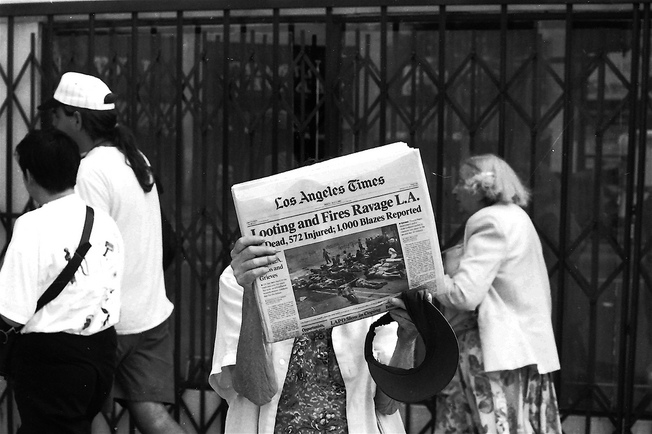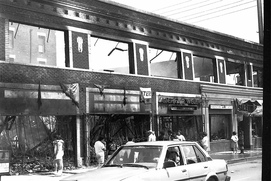A Look Back at the Los Angeles Riots
 © Dark Sevier, https://creativecommons.org/licenses/by-nc/2.0/legalcode
© Dark Sevier, https://creativecommons.org/licenses/by-nc/2.0/legalcode
If you have read the news headlines in any major newspaper over the past week, you have probably seen the word “riot” mentioned in many article titles. Riots have indeed been mentioned in news stories over the past several months, and not without reason: the protests and disturbances that have occurred in Ferguson, New York and now Baltimore have garnered much coverage and brought to light issues surrounding racial equality and police brutality. Cases such as those involving Michael Brown, Eric Garner and Freddie Gray have resulted in full-fledged protests, sometimes involving property-destruction and violence.
A little more than two decades ago, riots occurred in Los Angeles. Known widely as the 1992 Los Angeles riots, or the Rodney King riots, the disturbance occurred as a reaction to the acquittal of policemen involved in the beating of taxi driver Rodney King following a high-speed chase throughout the city. Despite videotape evidence of the police officers beating King, they were subsequently found not guilty of all charges, except one officer where the jury could not agree about the use of excessive force. Many saw the case and decision in racial terms: the police officers were mostly white, King was African-American and there were no African-Americans on the jury. After the decision was handed down, riots erupted throughout portions of the greater Los Angeles area on April 29th–twenty-three years ago last week–that lasted six days. There were over fifty-three deaths recorded, more than two thousand injuries and over eleven thousand individuals were arrested.
A little more than two decades ago, riots occurred in Los Angeles. Known widely as the 1992 Los Angeles riots, or the Rodney King riots, the disturbance occurred as a reaction to the acquittal of policemen involved in the beating of taxi driver Rodney King following a high-speed chase throughout the city. Despite videotape evidence of the police officers beating King, they were subsequently found not guilty of all charges, except one officer where the jury could not agree about the use of excessive force. Many saw the case and decision in racial terms: the police officers were mostly white, King was African-American and there were no African-Americans on the jury. After the decision was handed down, riots erupted throughout portions of the greater Los Angeles area on April 29th–twenty-three years ago last week–that lasted six days. There were over fifty-three deaths recorded, more than two thousand injuries and over eleven thousand individuals were arrested.
 © Dark Sevier
© Dark Sevier
Arthur Ashe, who was an outspoken proponent of nonviolent resolution to issues of racial inequality, expressed his extreme disappointment in the violent reaction to the acquittal, commenting, “I felt sick…That’s not us….We were once a people of dignity and morality, we wanted the world to be fair to us, and we tried, on the whole, to be fair to the world. Now I was looking at a new order that is based squarely on revenge, not justice, with morality discarded. Instead of settling on what’s right, or just, or moral, the idea was to get even. “
This was not the first time that Ashe reacted to protests of this nature. Eric Allen Hall, in his book titled “Arthur Ashe: Tennis and Justice in the Civil Rights Era,” documents a snippet of a conversation between Dr. Maulana Karenga, the creator of the pan-African and African-American holiday of Kwanzaa, and Ashe in which Ashe reacted to ideas of black nationalism by saying that a sense of self-imposition of segregation should be avoided, as well as creating a sense of distance between our fellow Americans.
Ashe’s comments provide an interesting perspective on the events of Los Angeles, Baltimore and Ferguson. Is the violence a form of revenge, deepening the divide between black and white Americans? Or are these riots actually catalysts for the kinds of political and social changes that are necessary in order to eliminate future police brutality and racial inequality? The LA Riots certainly did not solve the problem of these abuses, but neither have protests. More than twenty years after the Rodney King decision, we still have an alarming and unceasing number of cases where police hurt or kill unarmed men of color. These are questions worth considering when analyzing the current events as well as future of these issues within the United States.
This was not the first time that Ashe reacted to protests of this nature. Eric Allen Hall, in his book titled “Arthur Ashe: Tennis and Justice in the Civil Rights Era,” documents a snippet of a conversation between Dr. Maulana Karenga, the creator of the pan-African and African-American holiday of Kwanzaa, and Ashe in which Ashe reacted to ideas of black nationalism by saying that a sense of self-imposition of segregation should be avoided, as well as creating a sense of distance between our fellow Americans.
Ashe’s comments provide an interesting perspective on the events of Los Angeles, Baltimore and Ferguson. Is the violence a form of revenge, deepening the divide between black and white Americans? Or are these riots actually catalysts for the kinds of political and social changes that are necessary in order to eliminate future police brutality and racial inequality? The LA Riots certainly did not solve the problem of these abuses, but neither have protests. More than twenty years after the Rodney King decision, we still have an alarming and unceasing number of cases where police hurt or kill unarmed men of color. These are questions worth considering when analyzing the current events as well as future of these issues within the United States.
